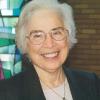
(Unsplash/Christian Wiediger)
"Sometimes the senior monks would come to classes with young monks like us, sitting on the floor and listening to a new monk speak. They weren't there to check on us--they were there to learn for themselves."
—Jay Shetty
The last few years, we have heard references to "nones and nuns" and the many ways the former are professing and living the values that the latter have lived for centuries: compassion, forgiveness, discipline, self-control, kindness, tenderness, stewardship, gratitude for life and self, meditation, fulfillment, vulnerability, vision for the future. Younger generations claim that they need to take time for the development of all of these rich personal qualities because of their belief that there is a connection between the inner life and their reaching out to others.
I have listened to people from the pre-1960s speak of the self-centeredness of younger generations — the "me, me, me" accusation. At the same time, these younger generations are also criticized for doing so much good for the environment, for serving the poor, for being kind to the elderly, for dressing simply in secondhand clothing and for going on missions to Guatemala. And yet, they are no longer going to church despite their upbringing and their years of expensive Catholic-Christian education.
Does this sound familiar?
I have been thinking, reading, listening to YouTube talks and searching for connections and understandings: intergenerational, intercultural, interracial — the range of diversity in our nation and world. Reading Jay Shetty's Think Like a Monk confirms my conviction (as a former formation director) that the values I mentioned above and a host of others lie in the hearts of many of our "nones" and younger people in this decade, just as they did in the hearts and souls of those born in former decades.
Advertisement
Not only Shetty but also figures like Brené Brown, Mel Robbins, Vishen Lakhiani, Dawn-Elise Snipes, Lexie Alford and Greta Thunberg offer ways for developing a spirit of self-discipline through ordering one's life. These include forgiveness for healing one's soul as well as for mending relationships, and compassion and kindness as approaches to every human person. They advocate turning any adversity into gratitude and learning, promote responsible stewardship of the Earth, engage in generous service, and prioritize personal wholeness to benefit others over narcissism.
I notice in their teachings, motivational lectures and written works some patterns that are instructive for people of all generations:
They are attempting to motivate people to live non-materialistic value-centered, mature, integrated and even disciplined lives.
They challenge others to use their talents and resources to enrich the lives of others.
They take advantage of technology to reach out to millions of people.
They have transitioned from earlier careers (law, monastic life, etc.) and there is no assurance that their current popularity will not evolve again with new societal needs.
They honor teachers and mentors, and mention Jesus, Mother Teresa, Moses, Buddha, Gandhi, Muhammad, and other saints and holy role models frequently.
They seek counsel, engage in prayer and meditation, and have the conviction that serving alongside others is better and a way to offset loneliness in our world. However, there seems to be little ongoing commitment to a church community or to frequent participation in the sacraments and rituals of the church.

From left: Robin Sharma (Wikimedia Commons/Sharmaleadership); Mel Robbins (Courtesy of www.melrobbins.com); Nick Vujicic (Wikimedia Commons/Gage Skidmore); Jay Shetty (Wikimedia Commons/IceTheAlohaGod); Brené Brown (Wikimedia Commons/BBeargTeam)
The majority of these motivational speakers have been born in the "famous '60s" or later:
- Mel Robbins (born 1968), YouTube;
- Brené Brown (born 1965), Sunday sermon at Washington National Cathedral, Jan. 21, 2018;
- Robin Sharma (born 1964), YouTube, The Monk Who Sold His Ferrari;
- Nick Vujicic (born 1982), YouTube;
- Jay Shetty (1987), YouTube, Think Like a Monk.
But I cannot exclude Oprah Winfrey (born 1954), considered by many to be the No. 1 motivational speaker who has helped millions of people to live more wholesome lives.
The world, the church, religious life and family life have changed drastically since 1960, when novitiates and seminaries were bulging with candidates. The current state of polarities, climate disasters and the dissolution of family and religious life remind us.
Despite these challenges, we know in our minds and hearts that the Creator is hovering over planet Earth, that Jesus has promised to be with the church always and that religious groups are called to meet the needs of changing times. We know that in the end "all shall be well," as Julian of Norwich assured her contemporaries.
So, I ask myself and all of us:
- What are the signs of the times telling us? Clearly, we will not live in large groups, and perhaps not in stable groups. Methods of reaching out and educating others will need to include the use of technology. Individual women and men will need to take time for personal development, quiet meditation, personal relationships, and the formation of teams and partnerships to accomplish their common visions.
- What kinds of organizing will be necessary to allow for the "both-and" of individual visions while nourishing community-bonding and identity and then responding together to meet others' needs in meaningful ways? Many congregations are looking at these issues now, wondering what kinds of evolution their groups may take. What will associates and volunteers be called to be and do? Will the original charisms of congregations evolve as needs change? What kinds of "structures" allow for individual discernment and freedom and at the same time, harmonize with congregational identity and continuity?
- What is the Holy Spirit asking of women and men of all ages, races and cultures in these critical times in the history of our world?
What are the generations teaching each other about personal wholeness, vision that responds to the needs of the time, technological and other means for serving others and honoring those who gifted us with the preparation to do all we can do for the creation of a better world — guided by the hovering God we name Holy Spirit?





